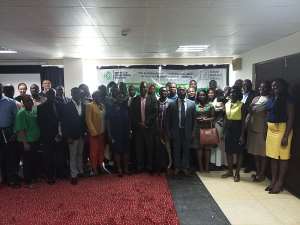
About 15% direct contribution to GDP are from mainstream resources such as cocoa; forestry and logging; mining and quarrying; and oil and gas.
The Director of United Nations University of Natural Resources in Africa, Dr. Elia Takor Ayuk said Ghana is losing 12percent of the value of its Gross Domestic Product through land degradation.
He noted the progressive degradation of the environment through human activities such as pollution of water bodies, deforestation due to increase demand for timer and fuel, modern agricultural practices such as excessive use of fertilizers and pesticide, and urbanization have declined soil fertility and further decrease production.
Dr. Ayuk added that increasing growth of population and demand for more residential areas and commercial sectors is also one of the reasons for land degradation.
He indicated that irresponsible mining and destruction of forest reserves have led to the loss of biodiversity and depletion of the topsoil.
“There is nothing wrong with mining but after mining what does the law say? You should restore the soil back to its natural form for agricultural activities. Therefore sustainable which is the always surviving away to restore the land called reclamation,” he stated.
Dr. Ayuk said there are several polices on land restoration in Ghana however, the challenge is the enforcement bit which has become bane of most African leaders.
According to Ghana beyond aid is a call for us to use our resources more efficiently and largely to the benefit of the good people of Ghana especially the host communities where those resources are extracted.
He said this at a breakfast meeting under the theme, “Ghana Beyond Aid-The Role of Natural Resources,” organized by the Institute of Green Growth Solutions in Accra.
The Technical Director for Mines at the Ministry of Lands and Natural Resources, Christopher Anokye indicated that developing the right policy frameworks to govern the resource sector is pivotal to how the natural resource of the country can contribute towards sustainable and inclusive growth and hence propel Ghana beyond Aid.
He emphasized that overcoming the level of poverty and inequality especially in resource host communities requires that the desired growth must be both sustainable and inclusive.
Mr. Anokye added that Ghana has the requisite legislative and institutional framework to enforce the rule of law and transparency in the management of our mineral resources.
“The Minerals and Mining Act, 2006 (Act 703) and its associated regulations; the Minerals (Royalties) Amendment Act, 2010 (Act 794) and the Income Tax Act, 2015 (Act 896) are some examples of the transparent and predictable framework that establishes not only the processes of acquiring concessions and establishing a mine, but also the distribution of the benefits therefrom on win-win basis,” he posited.
According to him, to ensure a win-win and mutually beneficial situation for both investors and Government alike, a comprehensive review of the mining fiscal and regulatory regime has been carried out.
He opined that in order to deepen the integration of the sector with the rest of the economy, Government has passed Regulations to guide implementation of local content in the mining sector.





 We’re disappointed over gov’t’s lacklustre attitude to negotiations of our condi...
We’re disappointed over gov’t’s lacklustre attitude to negotiations of our condi...
 No more Buffer Stock as Mahama promises to decentralise SHS food supply
No more Buffer Stock as Mahama promises to decentralise SHS food supply
 NSS urges President Akufo-Addo to sign National Service Bill into law
NSS urges President Akufo-Addo to sign National Service Bill into law
 You're lying, your 7-11pm dumsor attributed to overloaded transformers is false ...
You're lying, your 7-11pm dumsor attributed to overloaded transformers is false ...
 Consult Council of State on anti-gay bill – Mahama advises Akufo-Addo
Consult Council of State on anti-gay bill – Mahama advises Akufo-Addo
 Transport Ministry has no power to determine fares – COPEC
Transport Ministry has no power to determine fares – COPEC
 Brace yourselves for more economic hardship – Prof Adei to Ghanaians
Brace yourselves for more economic hardship – Prof Adei to Ghanaians
 Any government depending on IMF is likely to fail – Grand Coalition
Any government depending on IMF is likely to fail – Grand Coalition
 Ghana risks losing premium cocoa position due to galamsey – COCOBOD laments
Ghana risks losing premium cocoa position due to galamsey – COCOBOD laments
 Akufo-Addo launches NSS policy document to tackle under-utilisation of service p...
Akufo-Addo launches NSS policy document to tackle under-utilisation of service p...
